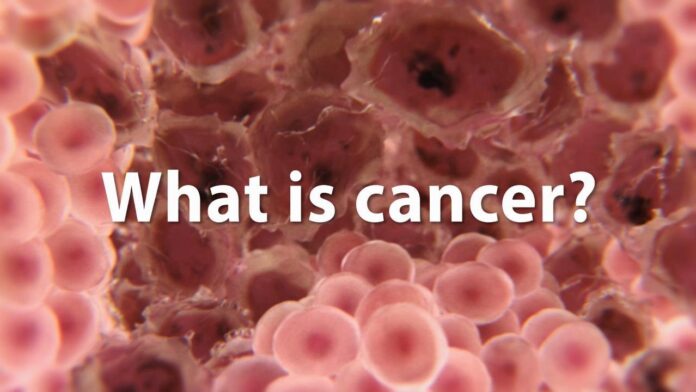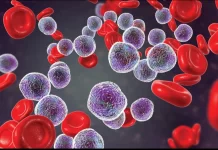Cancer is a disease in which some of the body’s cells grow uncontrollably and spread to other parts of the body.
Cancer can start almost anywhere in the human body, which is made up of trillions of cells. Normally, human cells grow and multiply (through a process called cell division) to form new cells as the body needs them. When cells grow old or become damaged, they die, and new cells take their place.
Cancerous tumors spread into, or invade, nearby tissues and can travel to distant places in the body to form new tumors (a process called metastasis). Cancerous tumors may also be called malignant tumors. Many cancers form solid tumors, but cancers of the blood, such as leukemias, generally do not.
Symptoms
Signs and symptoms caused by cancer will vary depending on what part of the body is affected.
Some general signs and symptoms associated with, but not specific to, cancer, include:
- Fatigue
- Lump or area of thickening that can be felt under the skin
- Weight changes, including unintended loss or gain
- Skin changes, such as yellowing, darkening or redness of the skin, sores that won’t heal, or changes to existing moles
- Changes in bowel or bladder habits
- Persistent cough or trouble breathing
- Difficulty swallowing
- Hoarseness
- Persistent indigestion or discomfort after eating
- Persistent, unexplained muscle or joint pain
- Persistent, unexplained fevers or night sweats
- Unexplained bleeding
TREATMENT
Biomarker Testing for Cancer Treatment
Biomarker testing is a way to look for genes, proteins, and other substances (called biomarkers or tumor markers) that can provide information about cancer. Biomarker testing can help you and your doctor choose a cancer treatment.
Chemotherapy
Chemotherapy is a type of cancer treatment that uses drugs to kill cancer cells. Learn how chemotherapy works against cancer, why it causes side effects, and how it is used with other cancer treatments.
Hormone Therapy
Hormone therapy is a treatment that slows or stops the growth of breast and prostate cancers that use hormones to grow. Learn about the types of hormone therapy and side effects that may happen.
Hyperthermia
Hyperthermia is a type of treatment in which body tissue is heated to as high as 113 °F to help damage and kill cancer cells with little or no harm to normal tissue. Learn about the types of cancer and precancers that hyperthermia is used to treat, how it is given, and the benefits and drawbacks of using hyperthermia.
Immunotherapy
Immunotherapy is a type of cancer treatment that helps your immune system fight cancer. This page covers the types of immunotherapy, how it is used against cancer, and what you can expect during treatment.
Radiation Therapy
Radiation therapy is a type of cancer treatment that uses high doses of radiation to kill cancer cells and shrink tumors. Learn about the types of radiation, why side effects happen, which side effects you might have, and more.
Stem Cell Transplant
Stem cell transplants are procedures that restore stem cells that grow into blood cells in people who have had theirs destroyed by high doses of chemotherapy or radiation therapy. Learn about the types of transplants, side effects that may occur, and how stem cell transplants are used in cancer treatment.
Surgery
When used to treat cancer, surgery is a procedure in which a surgeon removes cancer from your body. Learn the different ways that surgery is used against cancer and what you can expect before, during, and after surgery.


































